七年级英语下册复习重点(同义词)
新目标七年级英语下 专项复习----同义句(含答案)

新目标七年级英语下专项复习----同义句(含答案)1. His pen pal is from the USA.= His pen pal comes from the USA.= His pen pal is American.2. Where is the bank?= Is there a bank near here/in the neighborhood?= How can I get to the bank?= Can you tell me the way to the bank?= Which is the way to the bank?3. Take the first turning on the left.= Turn left at the first turning/crossing.4. The hotel is next to the house. There is a garden in the house.= The hotel is next to the house with a garden.5. Let’s see t he pandas first.= What about seeing the pandas first?=Shall we see the pandas first?=Why not see the pandas first?6. What other animals do you like?= What else do you like?7. What does he do?= What is he?= What’s his job?8. How was the weather?= What was the weather like?9. Thanks for helping me.= Thanks for your help.10. He is of medium build.= He has a medium build.11. It’s time for your lunch.= It’s time for you to have lunch.12. He has no dog and no family.= He doesn’t ha ve a dog or a family.13. I think the shop is closed this morning.= I don’t think the shop is open this morning.14. I don’t know.= I have no idea.15. Please give a book to me.=Please give me a book.16. What do you think of game shows?= How do you like game shows?17. This boy is eight years old.= This is an eight-year-old boy.18. He was late for school.= He came to school late.19. No photos!= Don’t take photos here.20. Miss Li is our English teacher.= Miss Li teaches us English.21. Lucy looks like Lily.= Lucy and Lily look the same.22. They are working.= They are at work.23. It often rains here.= There is much/ lots of/ a lot of rain here.= It is often rainy here.24. We often take a taxi to go there.= We often go there by taxi.25. He is on our school basketball team.= He is a member of our school basketball team.26. I spent five yuan on this pen.= I spent five yuan (in) buying this pen.= I paid five yuan for this pen.=It took me five yuan to buy this pen.27. He gave his sister a computer.= He gave a computer to his sister.= His sister got a computer from him.28. You mustn’t eat in class.= Don’t eat in class.29.He wants to do nothing.=He doesn’t want to do anything.30.Don’t arrive late for school.=Don’t be late for school.。
人教版七年级下册英语期末复习:Unit 7-Unit 12 各单元语法知识点复习提纲(全面!)
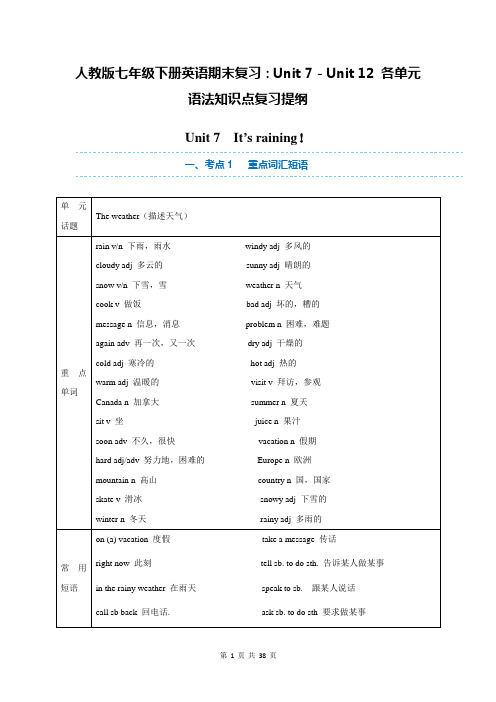
人教版七年级下册英语期末复习:Unit 7-Unit 12 各单元语法知识点复习提纲Unit 7 It’s raining!一、考点1 重点词汇短语1 messagemessage为可数名词,意为“消息,信息”,take a message for sb.“为某人捎个口信”。
拓展:give sb. a message 捎信给某人,leave a message 留口信,get the message 明白对方的意思。
Can I take a message for him?当某人发现要找的人不在或接电话的人发现打电话者要找的人不在时,常用此语2 could 情态动词意为“能,可以“,表示请求许可,在语气上比can委婉客气,但这种句式的肯定回答用can。
Could you just tell him to call me back?3 call及物动词,意为“打电话给”。
call sb. (up) “打电话给某人”,call sb. at +电话号码,意为“拨打……找某人”。
拓展:call 是一个多义词,call sb 可表示“叫醒某人,呼唤某人”;give sb. a call 给某人打电话。
4 back副词“回来,回原处,向后”;call sb. back给某人回个电话。
【即学即练】I’ll _____you _____.我将给你回电话。
5 visit此处用作及物动词,意为“拜访,探望”,后接表示人的名词或代词。
visit还可意为“参观,游览”,后接表示地点的名词。
拓展:visit还可用作可数名词,意为“访问,参观,拜访。
be on a visit to ... “正在访问/参观……”。
visitor参观者,游览者,游客。
I’m having a great time visiting my aunt in Canada._____ my grandparents every year at Christmas.我每年圣诞节都去探望我的祖父母。
七年级下册英语各单元总结复习 考试版(1)

七年英语下各单元知识点详解考试版Unit 1 Can you play the guitar?一、词汇拓展1分x 141. sing(现在分词)2. dance(现在分词)3. swim(现在分词)4.draw(同义词)5. story(复数)6. Write(同音词)7. drum(复数)8. piano(复数)9. also(同义词)11.want(招聘)10.make (单三)(现在分词)12.teach(名词)13. musician(名词)二、重点短语与句型1分x 311. 下国际象棋说英语弹吉它想做……2. 擅长于什么俱乐部游泳俱乐部擅长做某事喜欢做… 怎么样?讲故事讲故事俱乐部3. 跟…..说写小说为学校表演招聘…… 放学后打中国功夫来给我们表演4. 敲鼓弹钢琴拉小提琴5. 善于应付(处理)…的;和某人相处很好结交朋友在某方面帮助某人在周末有空/很忙拨打某人的……号码需要某人/某物做…… 说英语的学生加入…俱乐部,成为…中的一员三、关键句型1分x 131. you draw? Yes, I can. / No, I .2. What do you want to join?I want to the chess club and the basketball .What club Tom want to join? He to join the swimming club .3. You can the English club. good.4. I speak English and I can play soccer.5. Please Mrs. Miller 555-3721.四、重点语法1分x 281、can+ ,它不随和而变化。
(1)含有can的肯定句:主语+ +谓语动词的+其他。
(2)变一般疑问句时,把can提前:+主语+ +其他?肯定回答:,主语+can。
否定回答:No,主语+ .(3)含有can的否定句:主语+ +动词的原形+其他。
初中英语同义词辨析
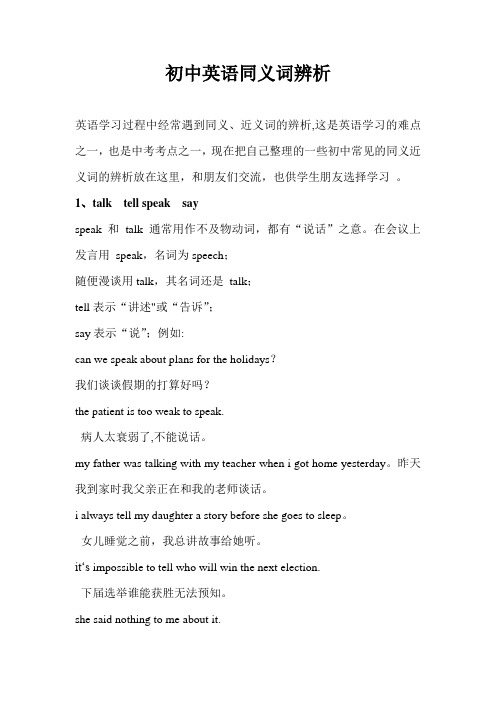
初中英语同义词辨析英语学习过程中经常遇到同义、近义词的辨析,这是英语学习的难点之一,也是中考考点之一,现在把自己整理的一些初中常见的同义近义词的辨析放在这里,和朋友们交流,也供学生朋友选择学习。
1、talk tell speak sayspeak 和talk 通常用作不及物动词,都有“说话”之意。
在会议上发言用speak,名词为speech;随便漫谈用talk,其名词还是talk;tell表示“讲述"或“告诉”;say表示“说”;例如:can we speak about plans for the holidays?我们谈谈假期的打算好吗?the patient is too weak to speak.病人太衰弱了,不能说话。
my father was talking with my teacher when i got home yesterday。
昨天我到家时我父亲正在和我的老师谈话。
i always tell my daughter a story before she goes to sleep。
女儿睡觉之前,我总讲故事给她听。
it‘s impossible to tell who will win the next election.下届选举谁能获胜无法预知。
she said nothing to me about it.关于这一点,她什么也没有对我讲.*speak 当及物动词用时,宾语一般是语言或词语之类的词。
如: does anyone speak english here?这儿有人会说英语吗?2、good well nicegood 形容词,好的,合适的,新鲜的,擅长的。
well 作形容词时,指"(身体)健康的”;还可用作副词,修饰动词。
nice形容词,美好的,令人愉快的,可爱的,特指取悦感官的事物。
she is good at english。
她擅长英语。
初中英语知识点归纳同义词和反义词概述
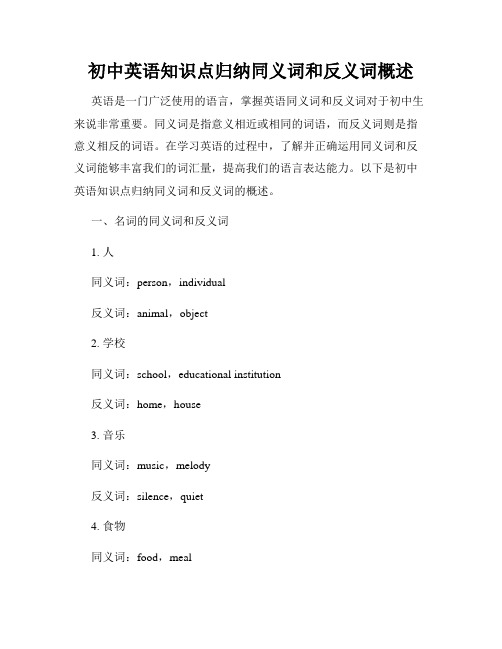
初中英语知识点归纳同义词和反义词概述英语是一门广泛使用的语言,掌握英语同义词和反义词对于初中生来说非常重要。
同义词是指意义相近或相同的词语,而反义词则是指意义相反的词语。
在学习英语的过程中,了解并正确运用同义词和反义词能够丰富我们的词汇量,提高我们的语言表达能力。
以下是初中英语知识点归纳同义词和反义词的概述。
一、名词的同义词和反义词1. 人同义词:person,individual反义词:animal,object2. 学校同义词:school,educational institution反义词:home,house3. 音乐同义词:music,melody反义词:silence,quiet4. 食物同义词:food,meal反义词:hunger,starvation 5. 动物同义词:animal,creature反义词:plant,vegetation二、形容词的同义词和反义词1. 好的同义词:good,excellent反义词:bad,poor2. 高兴的同义词:happy,joyful反义词:sad,unhappy3. 忙碌的同义词:busy,occupied反义词:idle,lazy4. 聪明的同义词:smart,intelligent反义词:stupid,dumb5. 漂亮的同义词:beautiful,gorgeous 反义词:ugly,plain三、动词的同义词和反义词1. 学习同义词:study,learn反义词:forget,neglect2. 听同义词:listen,hear反义词:ignore,disregard 3. 说同义词:say,speak反义词:be silent,keep quiet 4. 看同义词:see,watch反义词:blind,unable to see 5. 做同义词:do,perform反义词:undo,reverse四、副词的同义词和反义词1. 急忙地同义词:quickly,rapidly反义词:slowly,gradually 2. 高兴地同义词:happily,joyfully 反义词:sadly,unhappily 3. 安静地同义词:quietly,silently反义词:noisily,loudly 4. 慢慢地同义词:slowly,gradually 反义词:quickly,rapidly 5. 好好地同义词:well,properly反义词:badly,improperly通过学习以上初中英语知识点归纳的同义词和反义词,我们可以更准确地理解和运用英语词汇,丰富我们的语言表达能力。
初中英语中的同义词和反义词总结

初中英语中的同义词和反义词总结在学习英语的过程中,同义词和反义词是我们常常会遇到的词汇。
同义词指的是意思相近或相同的词语,而反义词则是指意思相反的词语。
掌握同义词和反义词不仅可以丰富我们的词汇量,还能提高我们的表达能力。
下面,我将总结一些初中英语中常见的同义词和反义词。
一、同义词1. Happy - glad这两个词都表示“高兴”的意思,但happy更常用于日常口语,而glad则更常用于书面语。
2. Big - large这两个词都表示“大”的意思,但big更常用于描述大小,而large则更常用于描述规模。
3. Beautiful - pretty这两个词都表示“美丽”的意思,但beautiful更常用于描述自然景色或艺术品,而pretty则更常用于描述人或物的外貌。
4. Help - assist这两个词都表示“帮助”的意思,但help更常用于日常口语,而assist则更常用于正式场合或商务交流。
5. Start - begin这两个词都表示“开始”的意思,但start更常用于日常口语,而begin则更常用于书面语。
二、反义词1. Hot - cold这两个词都表示“热”的意思,但hot表示高温,而cold则表示低温。
2. Fast - slow这两个词都表示“快”的意思,但fast表示速度快,而slow则表示速度慢。
3. Happy - sad这两个词都表示“快乐”的意思,但happy表示高兴,而sad则表示悲伤。
4. Big - small这两个词都表示“大”的意思,但big表示大的,而small则表示小的。
5. Easy - difficult这两个词都表示“容易”的意思,但easy表示简单,而difficult则表示困难。
通过学习同义词和反义词,我们可以提高我们的词汇量,丰富我们的表达方式。
同时,对于初学者来说,通过比较同义词和反义词的使用情境,我们也能更好地理解词汇的用法和语境。
因此,掌握同义词和反义词对于我们的英语学习是非常重要的。
七下U1知识清单
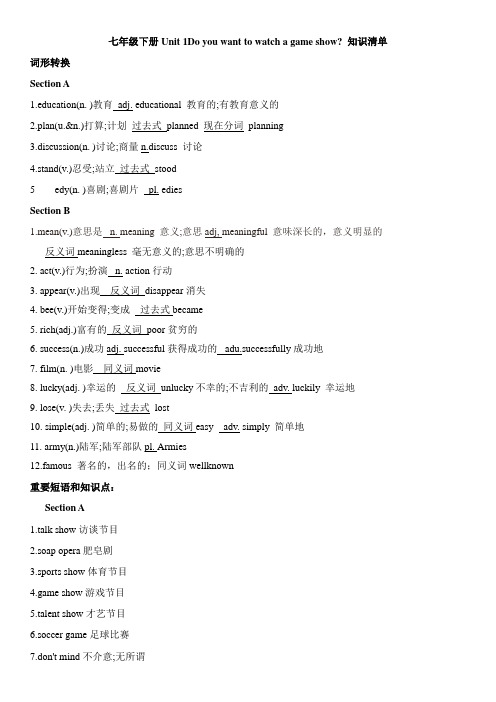
七年级下册Unit 1Do you want to watch a game show? 知识清单词形转换Section Acation(n. )教育adj. educational 教育的;有教育意义的2.plan(u.&n.)打算;计划过去式planned 现在分词planning3.discussion(n. )讨论;商量n.discuss 讨论4.stand(v.)忍受;站立过去式stood5 edy(n. )喜剧;喜剧片pl. ediesSection B1.mean(v.)意思是_ n. meaning 意义;意思adj, meaningful 意味深长的,意义明显的反义词meaningless 毫无意义的;意思不明确的2. act(v.)行为;扮演_ n. action行动3. appear(v.)出现反义词disappear消失4. bee(v.)开始变得;变成过去式became5. rich(adj.)富有的_反义词poor贫穷的6. success(n.)成功adj. successful获得成功的_ adu.successfully成功地7. film(n. )电影_ 同义词movie8. lucky(adj. )幸运的反义词unlucky不幸的;不吉利的adv. luckily 幸运地9. lose(v. )失去;丢失过去式lost10. simple(adj. )简单的;易做的同义词easy adv. simply 简单地11. army(n.)陆军;陆军部队pl. Armies12.famous 著名的,出名的;同义词wellknown重要短语和知识点:Section A1.talk show访谈节目2.soap opera肥皂剧3.sports show体育节目4.game show游戏节目5.talent show才艺节目6.soccer game足球比赛7.don't mind不介意;无所谓mind (one’s) doing介意某人做某事Do you mind my/me calling you at night?8. can't stand (doing) sth. 不能忍受Jack can’t stand staying at home.9. think of认为10. watch the news看新闻11. find out查明;弄清look for “寻找”,强调找的动作和过程What are you looking for?find “找到,发现”,强调找的结果He found the cat at last.Can you find out what time the meeting starts?12.around the world全世界13. have a discussion about.. 进行一场关于....的讨论14. my favorite TV shows我最喜欢的电视节目15. expect (sb.)(某人)做某事16. learn a lot from...从...中学到很多17. one day (有)一天18. hope to do sth. 希望做某事(主语希望自己)I hope to see you again.hope + that 从句I hope that he will e soon.19.plan to do sth.打算做某事;计划做某事make a plan for...为......制定计划We must make a plan for our holiday.21. watch a sports show观看体育节目Section B1.action movie动作影片2.scary movie恐怖片3.watch cartoons看动画片4.the black mouse with two large round ears 长着两只大圆耳朵的黑色老鼠5.over 80 years ago 80多年前6 e out出版;发行(出现;露面;开花等)7.in the 1930s在20世纪30年代of the main reasons最主要的原因之一to face any danger努力面对任何危险as例如;诸如for example 例如/get事;准备好做某事12.try/do one's best to dotry doing sth.试着做某事; Let’s try knocking at the door.try to do sth. 尽力做某事;I try to solve the problemtry on试穿You can try on this coat!13.be famous for因...而出名Guilin is famous for its mountains and rivers. be famous as 作为...而出名MoYan is famous as a writer.14.dress up 乔装打扮;装扮put on 穿上,侧重穿戴的动作;It’s cold, put on your coat.wear穿着,侧重穿戴的状态;She wears a red coat today.dress给...穿衣服The boy is too young to dress himself.15.take one’s place 代替,替换;相当于take the place of sb.必背句型Section A1. What do you think of talk shows?= How do you like talk shows?你们认为访谈节目怎么样?2. Then let's watch a talk show.那么让我们看访谈节目吧。
人教版初一英语下册知识点

人教版初一英语下册知识点
以下是初一英语下册部分重点知识点:
1. 一般现在时:表示经常或习惯性的动作或状态,常与always, usually, often, sometimes, every day 等时间状语连用。
2. 现在进行时:表示现在正在进行的动作或状态,常与now, at the moment, Look! Listen! 等时间状语连用。
3. 一般过去时:表示过去某个时间发生的动作或状态,常与yesterday, last week, in 2000 等时间状语连用。
4. 祈使句:用于表达请求、命令、建议或劝告等,通常以动词原形开头,句末用句号或感叹号。
5. There be 句型:表示“某地有某物”,其中be 动词的形式根据主语的单复数形式而定。
6. 形容词和副词的比较级和最高级:用于比较两个或两个以上的人或事物,比较级用于两者之间的比较,最高级用于三者或三者以上的比较。
7. 情态动词:表示能力、可能性、请求、建议、许可等,如can, could, may, might, must, have to 等。
初中英语知识点归纳同义词和反义词梳理

初中英语知识点归纳同义词和反义词梳理一、同义词梳理1. 完全相同的同义词在英语中,有些词汇完全相同,可以互换使用,它们的意思和用法都一样。
例如:- Happy 和 glad:意为“高兴的”;- Car 和 automobile:意为“汽车”;- Big 和 large:意为“大的”。
2. 词义相近的同义词有些词汇虽然不完全相同,但在某些情境下可以互换使用。
例如:- Buy 和 purchase:都表示“购买”;- Start 和 begin:都表示“开始”;- Friend 和 companion:都表示“朋友”。
3. 形容词的同义词形容词也存在一些同义词,可以用来描述人、事物等。
例如:- Beautiful 和 pretty:都可以用来形容漂亮的事物;- Brave 和 courageous:都可以用来形容勇敢的人;- Bright 和 intelligent:都可以用来形容聪明的人。
二、反义词梳理1. 对立意义的反义词有些词汇具有明显的对立意义,它们的含义完全相反。
例如:- Hot 和 cold:意为“热的”和“冷的”;- Young 和 old:意为“年轻的”和“年老的”;- Fast 和 slow:意为“快的”和“慢的”。
2. 逻辑关系上的反义词在英语中,一些词汇可以通过逻辑关系来确定其反义词。
例如:- Yes 和 no:意为“是”的肯定回答和“否”的否定回答;- Up 和 down:意为“向上”和“向下”;- In 和 out:意为“里面”和“外面”。
3. 功能上的反义词有些词汇具有相对的功能,它们在使用时可以根据具体语境来确定其反义词。
例如:- Borrow 和 lend:意为“借入”和“借出”;- Teach 和 learn:意为“教”和“学”。
总结:通过同义词和反义词的归纳梳理,我们可以更好地理解和应用英语词汇。
掌握这些同义词和反义词的用法,能够提升我们的语言表达能力,让我们的英语交流更加准确和流畅。
牛津译林版七年级下册英语Unit1-Unit8各单元语法知识点复习提纲详细版(全面,实用!)
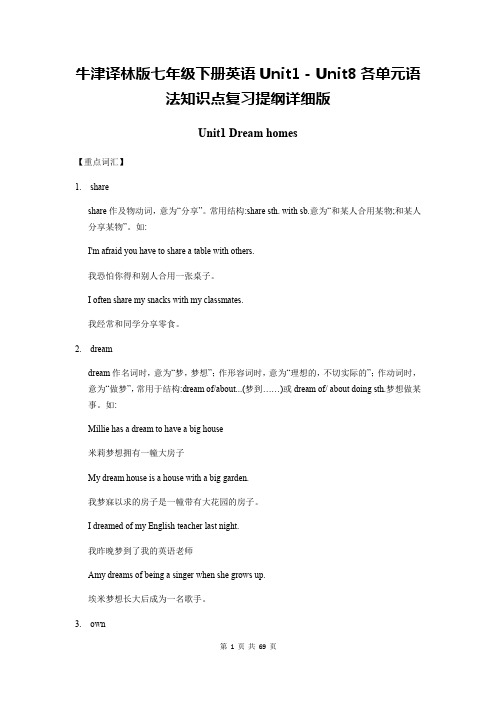
牛津译林版七年级下册英语Unit1-Unit8各单元语法知识点复习提纲详细版Unit1 Dream homes【重点词汇】1. shareshare作及物动词,意为“分享”。
常用结构:share sth. with sb.意为“和某人合用某物;和某人分享某物”。
如:I'm afraid you have to share a table with others.我恐怕你得和别人合用一张桌子。
I often share my snacks with my classmates.我经常和同学分享零食。
2. dreamdream作名词时,意为“梦,梦想”;作形容词时,意为“理想的,不切实际的”;作动词时,意为“做梦”,常用于结构:dream of/about...(梦到……)或dream of/ about doing sth.梦想做某事。
如:Millie has a dream to have a big house米莉梦想拥有一幢大房子My dream house is a house with a big garden.我梦寐以求的房子是一幢带有大花园的房子。
I dreamed of my English teacher last night.我昨晚梦到了我的英语老师Amy dreams of being a singer when she grows up.埃米梦想长大后成为一名歌手。
3. ownown作形容词.意为“自己的,属于自己的”,常和形容词性物主代词连用,构成短语of one's own,表示“属于某人自己的”,on one's own = alone,意为“独自地”。
own作动词时,表示“拥有”。
如:I have my own computer我有属于我自己的电脑。
That's a car of her own.那是她自己的汽车。
He lives on his own.他一个人生活。
人教版七年级英语下学期期末总复习重点知识汇总-(共64张PPT)
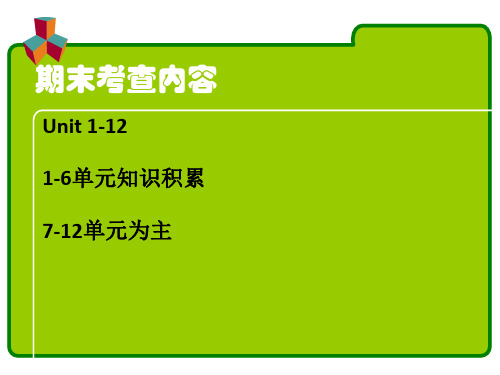
…To do/doing 两种用法பைடு நூலகம்
• find/see/ sb. do sth. → 观看/看见某人做某事 I saw you pick an apple just now. • find/see/sb. doing sth. → 观看/看见某人正在做某事 I saw you playing basketball with your classmates o
非谓语动词
• help sb. to do sth. →帮助某人做某事 Lucy often helps Lily to wash her clothes.
• help sb. do sth. →帮助某人做某事 He usually helps me learn English.
• help sb. with sth. →帮助某人做某事 I sometimes help my mother with the housework.
• take sb. to sp→带某人到某地 Mr. Wang took us to the Summer Palace last Sunday.
可跟双宾语的动词
• show sb. Sth→给某人看某物 Please show me the map. show sth. to sb. →把某物给某人看 Please show the map to me.
• buy sb. sth. →为某人买某物 Mother bought me a bike.
• buy sth. for sb. →为某人买某物 Mother bought a bike for me.
• give sb. sth →把某物给某人 Jim gave me an English dictionary.
初中英语英语中的同义词替换技巧
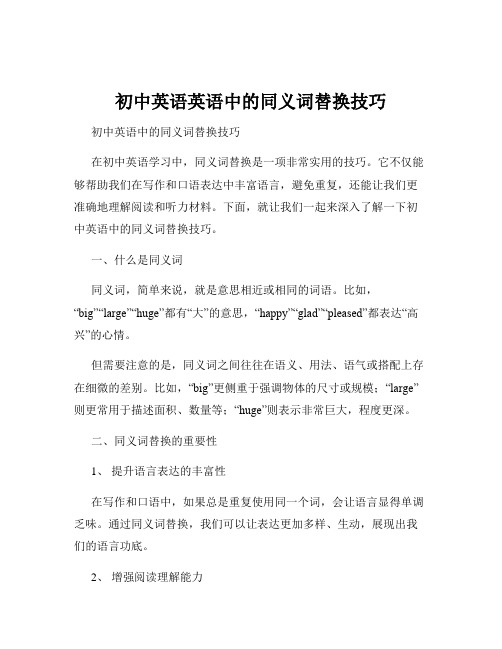
初中英语英语中的同义词替换技巧初中英语中的同义词替换技巧在初中英语学习中,同义词替换是一项非常实用的技巧。
它不仅能够帮助我们在写作和口语表达中丰富语言,避免重复,还能让我们更准确地理解阅读和听力材料。
下面,就让我们一起来深入了解一下初中英语中的同义词替换技巧。
一、什么是同义词同义词,简单来说,就是意思相近或相同的词语。
比如,“big”“large”“huge”都有“大”的意思,“happy”“glad”“pleased”都表达“高兴”的心情。
但需要注意的是,同义词之间往往在语义、用法、语气或搭配上存在细微的差别。
比如,“big”更侧重于强调物体的尺寸或规模;“large”则更常用于描述面积、数量等;“huge”则表示非常巨大,程度更深。
二、同义词替换的重要性1、提升语言表达的丰富性在写作和口语中,如果总是重复使用同一个词,会让语言显得单调乏味。
通过同义词替换,我们可以让表达更加多样、生动,展现出我们的语言功底。
2、增强阅读理解能力在阅读中,遇到生词时,如果能够想到它的同义词,就能更好地理解文章的意思。
3、提高听力水平听力材料中可能会使用同义词来表达相同的概念,如果我们熟悉同义词替换,就能更轻松地跟上听力的节奏。
4、应对考试在各种英语考试中,同义词替换经常出现在词汇、语法、阅读理解等题型中。
掌握这一技巧,有助于提高考试成绩。
三、同义词替换的方法1、积累同义词组平时学习中,要注意积累常见的同义词组。
比如,“be good at”可以替换为“do well in”;“lots of”可以替换为“a lot of”“plenty of”;“in the morning”可以替换为“in the early part of the day”等。
2、利用词缀很多单词通过添加不同的词缀可以变成同义词。
比如,“careful”和“careless”,“hopeful”和“hopeless”,“able”和“unable”等。
七年级英语下册复习重点同义词
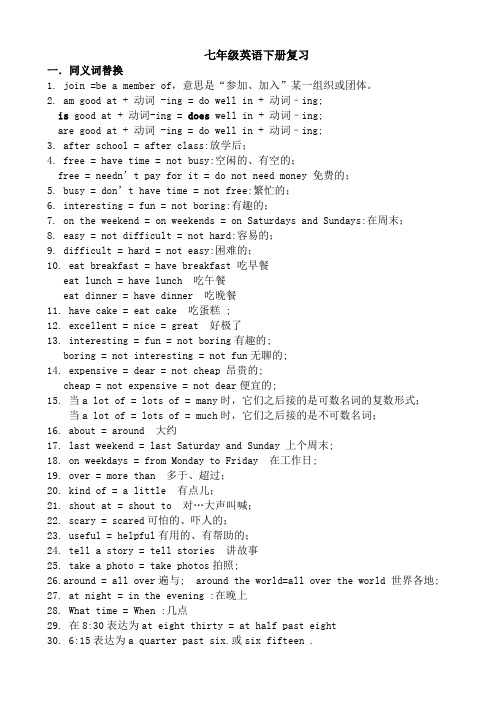
七年级英语下册复习一.同义词替换1. join =be a member of,意思是“参加、加入”某一组织或团体。
2. am good at + 动词 -ing = do well in + 动词–ing;is good at + 动词-ing = does well in + 动词–ing;are good at + 动词 -ing = do well in + 动词–ing;3. after school = after class:放学后;4. free = have time = not busy:空闲的、有空的;free = needn’t pay for it = do not need money 免费的;5. busy = don’t have time = not free:繁忙的;6. interesting = fun = not boring:有趣的;7. on the weekend = on weekends = on Saturdays and Sundays:在周末;8. easy = not difficult = not hard:容易的;9. difficult = hard = not easy:困难的;10. eat breakfast = have breakfast 吃早餐eat lunch = have lunch 吃午餐eat dinner = have dinner 吃晚餐11. have cake = eat cake 吃蛋糕 ;12. excellent = nice = great 好极了13. interesting = fun = not boring有趣的;boring = not interesting = not fun无聊的;14. expensive = dear = not cheap 昂贵的;cheap = not expensive = not dear便宜的;15. 当a lot of = lots of = many时,它们之后接的是可数名词的复数形式;当a lot of = lots of = much时,它们之后接的是不可数名词;16. about = around 大约17. last weekend = last Saturday and Sunday 上个周末;18. on weekdays = from Monday to Friday 在工作日;19. over = more than 多于、超过;20. kind of = a little 有点儿;21. shout at = shout to 对…大声叫喊;22. scary = scared可怕的、吓人的;23. useful = helpful有用的、有帮助的;24. tell a story = tell stories 讲故事25. take a photo = take photos拍照;26.around = all over遍与; around the world=all over the world 世界各地;27. at night = in the evening :在晚上28. What time = When :几点29. 在8:30表达为at eight thirty = at half past eight30. 6:15表达为a quarter past six.或six fifteen .31. 6:45表达为a quarter to seven.或six forty-five.32. 7:30表达为half past seven.或seven thirty .33. 8:20表达为twenty past eight.或eight twenty.34. 9:50表达为ten to ten.或nine fifty.35. 6:30表达为half past six = six thirty36. 3:15表达为a quarter past three = three fifteen37. 6:45表达为a quarter to seven = six forty-five38. 9:45表达为a quarter to ten = nine forty-five39. 在5:30表达为at half past five = at five thirty40. 在10:30表达为at ten thirty = at half past ten41. half an hour = thirty minutes:半个小时an hour = sixty minutes:一小时42. sometimes = at times 有时、偶尔43. before 10:00 = by 10:00:在十点之前44. take the train = go … by train:乘火车45. take the bus = go … by bus:乘公交车46. take the subway = go … by subway:乘地铁47. ride a bike = go … by bike:骑自行车48. walk = go … on foot:走路、步行49. What about you = How about you 你呢?50. must = have to必须51. keep quiet = be quiet 保持安静52. am from = come from 来自; is from = come s from 来自are from = come from 来自53. have = keep 饲养54. a lot = very much 非常like…a lot = like …very much 非常喜欢55. get lost = be lost 迷失、迷路56. wash the dishes = do the dishes 洗餐具57. be at home = be in 在家be not at home = be not in 不在家58. See you = Goodbye 再见59. want = would like 想要60. How’s the weather = What’s the weather like今天的天气怎么样?61. have a good time = have fun = have a good day = enjoy oneself 玩得开心(可用来表示祝福)62. great = fine = sunny 晴朗的63. have a good time + 动词-ing = have fun + 动词-ing .64. have to +动词原形 = must + 动词原形;65. around here = near here 在这附近66. Thanks so much. = Thank you very much. 非常感谢67. No problem. = You’re welcome. 不用谢、不客气;68. tall = not short 高的;69. short = not tall 矮的;70. long = not short 长的;71. short = not long 短的;72. curly = not straight 卷的;73. straight = not curly 直的;74. thin = not heavy = not fat 瘦的;75. heavy = fat = not thin 胖的、重的;76. young = not old 年轻的;77. medium height = not tall or short 中等身高;78. medium build = not heavy or thin 中等身材;79. be different from = not the same as 与……不同;80. the same age as = as old as 和……岁数一样大;81. cross = go across 从…的表面穿过;82. talk to = talk with与某人交谈83. be good with = get on well with与某人相处得好,与某人合得来;。
七年级英语下册同意句语法复习

1. His pen pal is from the USA. = His pen pal comes from the USA. = His pen pal is American. 2. Where is the bank? = Is there a bank near here? = How can I get to the bank? = Can you tell me the way to the bank? = Which is the way to the bank? 3. Take the first turning on the left. = Turn left at the first turning.
25. He is on our school basketball team. = He is a member of our school basketball team. 26. I spent five yuan on a pen. = I spent five yuan (in) buying a pen. = I bought a pen for five yuan. 27. He gave his sister a computer. = He gave a computer to his sister. = His sister got a computer from him.
四, 语态转换
e.g: They watched the boys play that morning.→ → The boys were watched to play that morning.
五,结构转换
复合句与简单句(use inf.), 陈述句与感叹句, 形容词与副词的级 复合句与简单句 , 陈述句与感叹句, (not so/as …as与than换)(比较级与 比较级与than any other/the others 与 换)(比较级与 /any others 或no one/ nobody else/ none…than= of/in…,favourite= like… best), 祈使句与条件句, 状语丛句与同义句型: , 祈使句与条件句, 状语丛句与同义句型: e.g: Lily is not so tall as Lucy.→ → Lily is shorter than Lucy. The problem is too difficult for me to work out.→ → The problem isn’t easy enough for me to work out. The problem is so difficult that I can’t work it out. The picture is very nice.→ → How nice the picture is! What a nice picture (it is)!
Unit 11 单元单词、短语、句子-人教版七年级英语下册
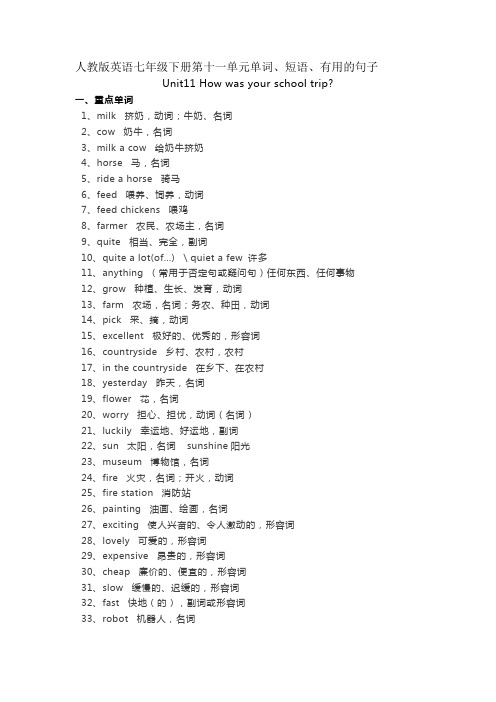
人教版英语七年级下册第十一单元单词、短语、有用的句子Unit11 How was your school trip?一、重点单词1、milk 挤奶,动词;牛奶、名词2、cow 奶牛,名词3、milk a cow 给奶牛挤奶4、horse 马,名词5、ride a horse 骑马6、feed 喂养、饲养,动词7、feed chickens 喂鸡8、farmer 农民、农场主,名词9、quite 相当、完全,副词10、quite a lot(of…) \ quiet a few 许多11、anything (常用于否定句或疑问句)任何东西、任何事物12、grow 种植、生长、发育,动词13、farm 农场,名词;务农、种田,动词14、pick 采、摘,动词15、excellent 极好的、优秀的,形容词16、countryside 乡村、农村,农村17、in the countryside 在乡下、在农村18、yesterday 昨天,名词19、flower 花,名词20、worry 担心、担忧,动词(名词)21、luckily 幸运地、好运地,副词22、sun 太阳,名词sunshine阳光23、museum 博物馆,名词24、fire 火灾,名词;开火,动词25、fire station 消防站26、painting 油画、绘画,名词27、exciting 使人兴奋的、令人激动的,形容词28、lovely 可爱的,形容词29、expensive 昂贵的,形容词30、cheap 廉价的、便宜的,形容词31、slow 缓慢的、迟缓的,形容词32、fast 快地(的),副词或形容词33、robot 机器人,名词34、guide 导游、向导,名词35、gift 礼物、赠品,名词,同义词:present36、all in all 总的说来,可以用于书面表达的结尾,用来作总结37、everything 一切、所有事物38、interested 感兴趣的,同义词interesting39、be interested in 对……感兴趣40、dark 黑暗的、昏暗的,形容词;dark黑暗,名词41、hear(heard)听到、听见,动词二、重点短语1. school trip 学校旅行2. go for a walk 去散步;take a walk 散步3. milk a cow 挤牛奶,此处的milk为动词,表示“挤奶”4. ride a horse 骑马5. feed chickens 喂鸡6. talk with a farmer 与农民交谈7. take some photos 照相8. quiet a lot 相当多9. ask some questions 问一些问题10. grow apples 种苹果11. show sb. around sw. 带某人逛某地12. learn a lot 学到许多13. from...to...从...到...14. pick some strawberries 摘草莓15. take ... home 把...带回家16. last week 上周17.In the countryside 在乡村18. visit my grandparents 拜访我的祖父母19. go fishing 去钓鱼20. sound good 听起来很好21. so much 这么\如此多22. at night 晚上23. go to the zoo去动物园24. climb the mountains 去爬山25. play some games 玩一些游戏e out出来;(花儿)开放27. visit a museum 参观博物馆28. visit a fire station 参观消防站29. draw pictures 画画30. go on a school trip 去旅行31. visit the science museum 参观科技博物馆32. along the way 沿途33. at the museum 在博物馆34. teach sb. to do sth. 教会某人做某事35. how to make a model robot 如何制作机器人模型36. gift shop 礼品店37. buy sth for sb. 为某人买某物,同义词:buy sb. Sth.38. all in all 总得来说,同义词:In a word39. be interested in... 对…感兴趣40. be expensive 昂贵的41. not...at all 一点儿也不42. at the zoo 在动物园三、重点句型1.—Did you see any cows? 你见到奶牛了吗?一Yes, I did. I saw quite a lot. 我见到了而且见到了很多很多。
初中英语常见的同义词或同义词组

、初中常见的同义词或同义词组1.be friendly to each other =get on /along well with …2.all right =OK3.alone =on one’s own=by oneself4.a little +n. = a bit of + n.5.at the moment =now6.be a Russia = come from Russia = be from Russia7.be good at =do well in8.be OK=be all right9.be working =be at work10.be weak in =be bad at11.be busy with =be busy doing12.be proud of= take pride in….13.but =except (除外)14.do one’s best to do sth. =try one’s best to do sth.15.each other =one another16.everywhere=here and there17.fall asleep =go to sleep18.fly to…=go to…by plane/air19.get to=arrive at/in = reach20.have a good time =enjoy oneself=have fun21.have enough money for・・・=afford to buy ・・・22.just now=a moment ago23.learn ・・・by oneself=teach oneself24.leave・・・=be away from25.look after =take care of26.mean・・・=the meaning of27.more than=over28.not again=no more=not any more29.prefer sth. to sth.=like sth. better than sth.30.receive a letter from sb.=hear from sb.31.ring (up)sb.=call (up)sb.=phone sb.=make a phone call to sb.32.say no to sb.=refuse sb.33.sleep well=have a good sleep34.see a film=go to the cinema35.start(开始)=begin36.start(出发)=set out37.take a car to go to sp.=go to sp. by carpart in=be in39.visit sp. =pay/ have a visit to sp.40.catch the bus=take the bus二、反义词或反义词组的替换1.after=before2.(A) borrow …from (B)-(8)lend…to…(A)3.catch up with-fall behind4.catch the bus-miss the bus5.early-late6.easy-difficult7.find-lose8.get off-get on9.in front of-behind10.miss=catch11.near -far away from12.remember-forget13.something/anything-nothing14.switch off-switch on /turn on15.the same as-different from16.write to sb. -hear from sb.三、形容词、副词比较级的不同形式的替换1.He is as tall as I . =He is the same height as I .2.He is as old as I .=He is the same age as I .3.This box is as heavy (long,wide,deep)as that one.= This box is the same weight(length, width, depth) as that one.4.Bill did better than Lin Tao.=Lin Tao did not do so well as Bill.5.I haven’t as many story-books as he.=He has more story-books than I .6.Japanese is not so popular as English.= Japanese is less popular than English.7.It’s so important a match that we must see it.= =It’s such an important match that we can't miss it.常见形容词/副词/的句型1.as +形容词/副词+asthe same+名词+as2.not so (as) +形容词/副词+as形容词/副词比较级+thanless +形容词/副词比较级+than3.such a/an +形容词+名词so+形容词+a/an+名词四、合并句子1. too+形容词to do / so…thatHe is very young . He can't carry the box.-He is too young to carry the box.-He is so young that he can't carry the box.2.形容词/副词+enogh to do…Edison was very clever. He could invent a lot of things. Edison was clever enough to invent a lot of things.3.either・・・or■…You can do this before class, and you can also do it after class.You can do this either before class or after class.4.neither・・・nor■…There is no air on the moon. There is no water on the moon.There is neither air nor water on the moon.5.neither of■…Your answer is wrong. My answer is wrong, either. Neither of our answers is right.6.none ofTom hasn't passed the exam. Peter and Ken haven’t passed the exam, eihter.None of the three boys has passed the exam.7.both・・・and・・・He knows English. His wife knows English,too.Both he and his wife knows English.8.not only・・・but also・・・Mrs. Smith is my teacher. She is also my good friends. Mrs. Smith is not only my teacher, but also my good friend.…that…How fast the little boy is running! I can't catch up with him.The little boy is running so fast that I can't catch up with him.10.without.…I won’t work well if you don't help me.I wo n’t work well without your help.11.exceptAll are here, but our English teacher isn't .Everyone is here except our English teacher.12.It is +adj. of sb. to do sth.You help me a lot. You are really nice.It's really nice of you to help me a lot.13.…if(条件状语从句)The weather won’t be fine tomorrow. We’ll have to stay at home.We'll have to stay at home tomorrow if the weather won't be fine.Start before 4 o’clock. Or you may miss your plane.You may miss your plane if you don't start before 4o'clock.五、单句与复句互换1.so…that…(从句)・・・too・・・to do・・・■■■enough to do….The room is so small that my family can't live in.-The room isn't big enough for my family to live in.-The room is too small for my family to live in.2.find that(从句)find sb. +宾语补语We found (that)he is a good pupil.We found him a good pupil.3.…what/where/when/how(从句)…what/where/when/how to do …-Please tell me where we show our tickets.-I am not sure what I should do next.-Please tell me where to show our tickets.-I am not sure what to do next.4.hope that (从句)hope to do …I hope that I can see you soon.I hope to see you soon.5.It is ・・・(some time) since (从句)did…some time agoSb. has been…for some time -It is ten years since his grandfather died.-It is five years since she became a nurse.-His father died ten years ago.-She has been a nurse for five years.6.It seems (seemed) that (句子)Sb. seems(seemed) to do sth.It seemed that they won the match.They seemed to win the match.7.It took sb. + some time + to do sth.Sb. spent+some time+(in) doing sth.It took me two hours to buy the book yesterday.I spent two hours reading the book yesterday.8.sb. spend + some money +on/doing sth.Sb. pay+some money +for sth.Sth. cost +sb. +some moneyHe spent 180 yuan on that toy.-He paid 180 yuan for the toy.-The toy cost him 180 yuan.9.If…,you’ll…Do…,or…If you don't hurry up, you'll miss the train.Hurry up, or you'll miss the train.10.It is + 形容词+of sb. to do sth.Sb. is +形容词to do sth.It is very kind of you to help me with my maths. You are kind to help me with my maths.六、意思相同或相近的句型的替换-What's the weather like today?- How is the weather today?- What do you think of Shenzhen?-How do you like Shenzhen?七、改写句子专项训练I .同义句或同义词组的替换训练题1.I don't have enough money to buy the dress.=I can't afford (to buy) the dress.2.Lily learned Chinese all by herself.=Lily taught herself English.3.Did you sleep well last night?=Did you have a good sleep last night?4.She lived alone.=She lived by herself/ on her own.5.I said no to him.=I refused him.6.I did my best to study English.=I tried my best to study English.7.I don't know the meaning of this word.=I don’t know what this word means.8.I am going to fly to Beijing next week.=I am going to Beijing by air/plane next week.9.They often go to see a film on Sunday evenings.=They often go to the cinema/ the movies on Sunday evening.10.Which sport are you in today?=Which sport do you take part in today?11.He usually goes to work by bike.=He usually rides to work.12.I won’t do it again.=I am not going to do it any more.13.He is a Russian.=He is from Russia.14.He is looking for his pen everywhere?=He is trying to find his pen here and there.15.The man reached Beijing yesterday.=The man arrived in Beijing yesterday.16.Every day, Yao Ming receives letters from thousands of baketball fans.=Every day, Yao Ming hears from thousands of basketball fans.foreigners have visited the Great Wall.=The foreigners have been to the Great Wall.18.Mr. Brown left London six years ago.=Mr. Brown has been away from London for six years.=It is six years since Mr. Brown left London.19.Mr. Smith is working.=Mr. Smith is at work.20.Lin Feng is weak in English.==Lin Feng is bad at English.==Lin Feng isn’t good at English.21.The boy will be OK if I do one small operation on him.=The boy will be all right if I do one small operation on him.22.Jim rang you up a moment ago.=Jim called you just now.=Jim made a phone call to you just now.23.They are playing football now.=They are playing football at the moment.24.Did your parents have a good time in Shenzhen?=Did your parents enjoy themselves in Shenzhen? 25.Jane prefers English to maths.=Jane likes English better than maths.26.The Smiths flew to London for their holiday yesterday afternoon.=The smiths left for London by air for their holiday yesterday afternoon.went to see me last week.=Jim visited me last week.28.The nurse looks after the baby carefully.=The nurse takes care of the baby carefully.29.Can you look after my dogs when I’m away?=Can you take care of my dogs when I’m not here/at home?30.The boy wanted a little milk to drink.=The boy needed a little milk to drink.=The boy wanted to drink a little milk.31.Mother was busy with some housework when I got home.=Mother was busy doing some housework when I got home.32.The boy’s teacher was very proud of him.=The boy’s teacher took pride in him.=The boy was the pride of his teacher.33.He couldn't fall asleep all night.=He wasn’t able to go to sleep all night.34.My mother went to Guangzhou last week, and she is there now.=My mother has been in Guangzhou since last week.35.The children are wearing beautiful clothes.=The children are in beautiful clothes.II.反义词或反义词组训练1.Her parents haven’t writte n to their daughter for a long time.=The daughter hasn’t heard from her parents for a long time.2.Remember to turn off the lights when you leave the room.=Don’t forget to turn off the lights when you leave the room.3.I think it is different from Chinese names.=I don’t think it is the same as Chinese names.4.If you don't hurry up, you’ll miss the early bus.=Hurry up, and you’ll catch the early bus.5.Can I borrow a knife from you?=Can you lend a knife to me?=Can you lend me a knife?6.The runner couldn't catch up with the others in the race.=The runner fell behind the others in the race.7.He can't hear anything.=He can hear nothing.8.The station is near the bus stop.=The station is not far from the bus stop.9.They knew something about it only after you told them.=They knew nothing about it before you told them. 10.The tree is behind the house.==The house is in front of the tree.11.Summer comes after spring.=Spring comes before summer.12.I think he is wrong.=I don’t think he is right.13.Remember me to your parents.=Don’t forget me to your parents.=Give my regards to your parents.14.May I borrow your bike?=Can you lend your bike to me?15.My computer is not the same as yours.=My computer is different from yours.16.Lily didn't go to school yesterday, Lucy didn't go to school, either.=Neither Lily nor Lucy went to school yesterday.III.形容词、副词比较级的训练题1.The earth is bigger than the moon.=The moon is smaller than the earth.2.Jim is not so careful as Bob.=Jim is more careless than Bob.=Bob is more careful than Jim.3.Jim runs faster than any other student in his class. =Jim runs the fastest in his class.4.I don't think history is as interesting as art.=I think history is less interesting as art.=I think art is more interesting as history.5..Jim runs faster than the other students in his class. =Jim runs the fastest in his class.=Jim runs faster than any other student in his class.IV.合并句子训练题1. I don't want any meat. I want some vegetables.=I want some vegetables instead of meat.2. This shirt doesn't look nice. That shirt doesn't look nice, either.=Neither of these two shirts looks nice.3. He hasn't been to France. She hasn't been to France, either.=Neither she nor she has been to France.4. The old woman was angry. She couldn't say a word. =The woman was too angry to say a word.=The woman was so angry that she couldn’t say a word.5. Jane prefers English to maths. So does Ann.=Both Jane and Ann like English better than maths.6. I am a League member. He is a League member, too. =Both he and I are League members.7. She is very short. She can't reach the apples on the tree.=She is too short to reach the apples on the tree.=She is so short that she can’t reach the apples on the tree.8. The room isn't very big. It can't hold a lot of people. =The room is not big enough to hold a lot of people.9. I don't know Russian. He doesn't know Russian, either.=Neither he nor I knows Russian.10. The hat is too big for me, and that one is too small for me.=The two hats are either too big or too small for me. 11. We can't finish the work if you don't help us.=We can’t finish the work without your help.12. Hurry up, or we’ll miss the early bus.=If we don’t hurry, we won’t catch up with the early bus.1 3 . You may answer my question in English, or you may answer it in Chinese.=You may answer my question either in English or in Chinese.1 4 . Mr. White is a teacher. He is also a musician.=Mr. White is not only a teacher, but also a musician.1 5 . He was very careful in the exam. Then he made few mistakes.=He was so careful in the exam that he didn’t make any mistakes.1 6 . He’s too young to go to school.=He is not old enough to go to school.17 . When he was young, he could not read. And he could not write, either.=He could neither read nor write when he was young.28 . He heard a boy crying for help outside, then he rushed out of the room.=He rushed out of the room as soon as he heard a boy shouting for help outside.39 . I have something to tell you. It’s interesting.=I have something interesting to tell you.40. Her father can't help her with her lessons, and her mother can't , either.=Neither her father nor her mother can help her with her lessons.V. 单句与复句的互换训练题1.I don’t know what I should say at the meeting.=I don’t know what to say at the meeting.2.Lucy took a basket and went out of the house.=Lucy went out of the house with a basket.3.Could you tell me how to get to the post office?=Could you tell me how I can get to the post office? 4.The teacher told us that we would not meet at the school gate.=The teacher told us not to meet at the school gate. 5.He told me that I should not make any noise in the=He told me not to make any noise in the library.VI.意思相同或相近的句型的替换训练题1.How do you like our city?=What do you think of our city?2.How is the weather today?=What’s the weather like today?3.What’s wrong with you?=What’s the matter with you?4.It is time for class.=It is time to have class.5.What a cold day it is today!=How cold it is today!6.He went to bed after his father came back.=He didn’t go to bed until h is father came back.=He didn’t go to bed before his father came back.7.Lucy gave Jim the flower at once when she got it. =Lucy gave the flower to Jim as soon as she got it.8.Mr. Smith has been in China for over ten years.=It is more than ten years since Mr. Smith came to9.It took me three hours to finish writing the article. =I spent three hours finishing writing the article. 10.I paid over 100 yuan for this dictionary.=I spent 100 yuan on the dictionary.=The dictionary cost me 100 yuan.11.He bought the book two weeks ago.=He has had the book for two weeks.=It is two weeks since he bought the book.12.He can finish the work easily.=It is easy for him to finish the work.13.It’s good for your health to take exercise often.=To take exercise often is good for your health.14.Not all of the people in the USA are rich.=Only some of the people in the USA are rich.15.Maybe they will tidy the garden today.=They may tidy the garden today.16.What’s wrong with you?=What’s the matter with you?17.We had a good time at the party.=We enjoyed ourselves at the party.18.We got to the school at half past seven.=We arrived at school at half past seven.19.Why don’t you do it by yourself?=Why not do it on your own?20.When he was ten years old, the boy died.=The boy died at the age of ten.21.He is as tall as I .=He is the same height as I .22.I spent 60 yuan (in) buying the ticket.=I paid 60 yuan for the ticket.23.Thank you very much for your coming.=It is very kind of you of you to come here.24.I found the film was interesting.=I found the film interesting.25.The teacher told the students that they should not play in the street.=The teacher told the students not to play in the street.26.She didn’t go to work because she was ill.=She didn’t go to work because of his illness.=She was ill, so s he didn’t go to work.27.The box is too heavy for me to carry.=The box is not light enough for me to carry.=The box is so heavy that I can’t carry it.28.The boy is only ten, but he speaks English very well.=Although the boy is only ten, he speaks English very well.29.There are three buildings in the school.=The school has three buildings30.The leaves became yellow.=The leaves turned yellow.31.Don’t forget me to your parents.=Remember me to your parents.32.You are right to do so.=It’s right for you to do so.33.We had a good time.=We enjoyed ourselves.34.He plays tennis well. She plays it well, too.=Both he and she play tennis well.35.I don’t speak Japanese and he doesn’t speak Japanese, either.Neither he nor I speak Japanese.36.He did not go until night.He left at night.37.I was too excited to go to sleep.I was so excited that I couldn’t go to sleep.38.If you don’t get up early, you’ll be late.Get up early, or you’ll be late.39.I forgot I had locked the door.I forgot locking the door.40.He paid 20 dollars for the dictionary.-He spent 20 dollars on the dictionary.-The dictionary cost him 20 dollars.41.English is not so difficult as maths.-English is less difficult than maths.-Maths is more difficult than English.42.It’s dangerous to climb that tall tree.To climb that tall tree is not safe.43.Miss Zhao went to look after the man hurriedly.-Miss Zhao went to take care of the man in a hurry. 44.The snow was heavy last night.It snowed heavily last night.45.How old are you?What is your age?46.Our teacher left the lab after he had got everything ready.Our teacher didn’t leave the lab until he had goteverything ready.47.It took us two days to prepare for the English evening.We spent two days getting ready for the English evening.48.We came home when it was six o’clock.We came home at si x o’clock.49.The dictionary cost me 106 yuan.I paid 106 yuan for the dictionary.50.He went on reading the book.-He didn’t stop reading the book.。
英语七年级下册知识点归纳

七年级下册英语知识点归纳一、词汇1.重点单词-can(情态动词,能、会);dance(跳舞、舞蹈);swim(游泳);sing (唱歌);draw(画画);speak(说、讲);join(参加、加入);club(俱乐部);tell(告诉、讲述);story(故事、小说);write(写作、写字);show (演出、节目);or(或者、也不);talk(交谈、谈话);guitar(吉他);piano (钢琴);violin(小提琴);also(也、而且);people(人、人们);home (家、活动本部);make(使成为、制造);today(在今天、当今);center (中心、中央);weekend(周末);teach(教、讲授)。
-get up(起床、站起);dress(穿衣服、连衣裙);brush(刷、刷净);tooth(牙齿);shower(淋浴、淋浴器);usually(通常地、一般地);forty(四十);never(从不、绝不);early(早的);fifty(五十);job(工作、职业);work(工作);station(电(视)台、车站);o'clock(……点钟);night(晚上、夜晚);funny(奇怪的、滑稽好笑的);exercise(锻炼、练习);best(最好的、最好地);group(组、群);half(一半、半数);past(晚于、过(时间));quarter(一刻钟、四分之一);homework(家庭作业);run(跑、奔);clean(打扫、弄干净);walk(行走、步行)。
- take the subway / train / bus(乘地铁/火车/公共汽车);ride a bike / walk(骑自行车/步行);every day(每天);by bike / bus / subway(骑自行车/乘公共汽车/乘地铁);think of(认为);between…and…(在……和……之间);cross (横过、越过);river(河、江);many(许多);village(村庄、村镇);bridge (桥);boat(小船);ropeway(索道);year(年、岁);afraid(害怕、畏惧);like(像、怎么样);leave(离开、留下);dream(梦想、睡梦);true (真的、符合事实的)。
七年级英语下册【同义词组】总结
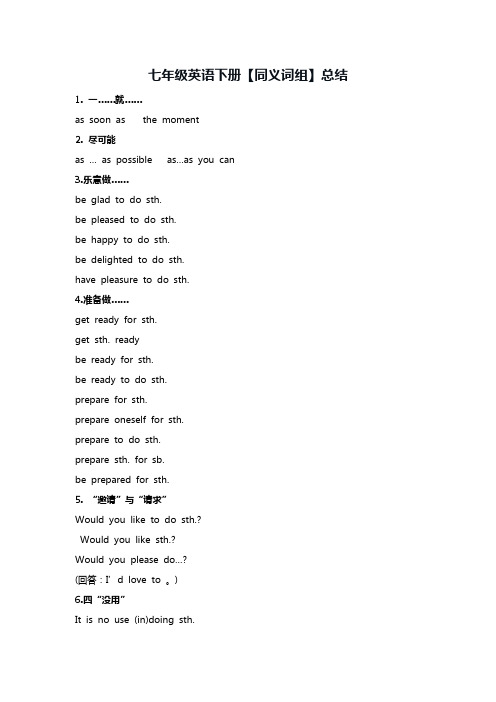
七年级英语下册【同义词组】总结1. 一……就……as soon as the moment2. 尽可能as …as possible as…as you can3.乐意做……be glad to do sth.be pleased to do sth.be happy to do sth.be delighted to do sth.have pleasure to do sth.4.准备做……get ready for sth.get sth. readybe ready for sth.be ready to do sth.prepare for sth.prepare oneself for sth.prepare to do sth.prepare sth. for sb.be prepared for sth.5. “邀请”与“请求”Would you like to do sth.?Would you like sth.?Would you please do…?(回答:I’d love to 。
)6.四“没用”It is no use (in)doing sth.It is useless to do sth.It is no good (in) doing sth.7. 如此表示“结果”so …that…enough to do sth.too …to…8. 八“花费”sb. spends some time/money on sthsb. spends some time/money (in) doing sth. sb. pays some money for sth.sb. buy sth. for some money.(sb sells sth. for some money.)sth. costs sb. some time/moneyIt costs sb. some money/time to do sth.It takes sb. some time/money to do sth.It takes some time/money for sb. to do sth.9. 五“为了”so that (引导目的状语从句)in order that (引导目的状语从句)so as to do sth. (引导目的状语,只位于句尾) in order to do sth. (引导目的状语,可首可尾) to do sth. (引导目的状语,可首可尾)10. 三“以至于不”too…to…so ……that…not…not…enough to…11. 两“习惯”be used to doing sth.12. 三个表示建议的表达What about sth./doing sth.? How about sth./doing sth.? Why not do sth.?13. 四“出什么毛了”What’s the matter with…? What’s wrong with…? What’s the trouble with…? What happens to…?14. 两“为什么不”Why not do sth.?Why don’t you do sth? 15. 三“不但……且……”not only…but alsonot only…but…not only…but…as well16.“劝阻”“阻止”stop sb. from doingkeep sb. from doingprevent sb. from doing discourage sb. from doing sth. dissuade sb. from doing sth. 17. 六“相处”get on with sb.get on well with sb.get along with sb.get along well with sb.mix with sb.mix well with sb.18. 五“因为”thanks to due to because ofas a result of owing to19.两“形式”It’s+ adj. (for/of sb. ) to do sth. (形式主语) find/think/feel it + adj. + to do sth. (形式宾语) 20. stress 句型汇总be stressed outbe under a lot of stresstake\stand the stress 忍受压力put stress on sth. 强调21. 两“弥补”make up for compensate for22. 五个“在…看来”in one’s opinion, to one’s mindin one’s view in one’s eyeaccording to sb.23. 三“丢”be lost be missing be gone24. 八“著名”be famous for sth.be famous to sb.be famous as + 职位be famous to sb. as+ 职位be known for sth.be known to sb.be known as+ 职位be known to sb. as+ 职位25. 四“满意”be satisfied withbe pleased withbe happy withbe delighted with26. 四“为……而高兴”be pleased for sbbe happy for sb.be glad for sb.be delighted for sth.27. 两“祝贺”congratulate sb. on sth. congratulations to sb. on sth. 28. 两“道歉”apologize to sb. for sth.make an apology to sb. for sth.29. 三“玩得高兴”have a good timehave fun (doing sth.)enjoy oneself30. 九“决定”decide to do sth.make a decision to do sth. determine to do sth.be determined to do sth.make a determination to do sth resolve to do sth.make a resolution to do sth. make up one’s mind to do sth.set one’s mind to do sth.。
英语人教版七年级下册同义词辨析

英语⼈教版七年级下册同义词辨析同义词辨析故城运河中学周俊艳教学⽬标:学习三组同义词的辨析1. spend, take, pay, cost2.another, other, the other, the others, others, else3. a litter, litter, a few, few短语:1,spend……on spend ….(in)doing pay …for .. it takes sb sometime to do sth. 2, one … the other….. some….. others…. What else教学重难点:三组词的理解与运⽤。
学⽣要在三组词的理解透彻的基础上,在练习中加以巩固。
⼀、spend , take, pay, cost都意为“花费”,但⽤法不同。
spend 的主语为⼈①“⼈+spend+时间/⾦钱+on sth.”表⽰“某⼈在某物上花费时间/⾦钱”。
He spent fifty dollars on these books.②“⼈+spend +时间/⾦钱+(in)doing sth,”表⽰“某⼈花时间/⾦钱做某事”。
I spend two days (in) reading the books.pay的主语为⼈“⼈+pay+⾦钱+for sth.”“表⽰某⼈⽀付多少钱买某物”。
She paid twenty yuan for the book.她⽀付了20元钱买这本书。
cost的主语为物或某事“物+cost+⼈+⾦钱”表⽰“某物花了某⼈多少钱”。
The book cost her twenty yuan.这本书花了她20元钱。
take 带两个双宾语It takes sb. Some time to do sth.=sb. Spend some time (in )doing sth.表⽰“做某事花了某⼈多长时间”。
It took me seven days to finish the task.=I spend seven days finishing the task.Exercise1.I’m interested in animals, so I ____every Saturday working in an animal hospital.A.pay B cost C take D spend2.They spend too much time____ the report.A. writing B to write C write D on writing3.How much the pen ____ you?A payB costC take Dspend4.Will you please___ for my dinner ,peter?A spendB takeC payD cost5. It will___ me too much time to read this book.A. take B spend C cost D payI spent two hours solving these problems.(同义句)___ ____ _____ two hours ____ ___ these problems.He spends fourteen yuan on the book.(同义句)He ______ fourteen yuan ___ the book.The book _____ him fourteen yuan.⼆、another、other 、others 、the other 、the others 、else 的区分1.another泛指(指三者或三者以上中的)另⼀个,既可作代词⼜可作形容词其后可加可数名词单数,后与数词+可数名词复数连⽤。
深圳版初一英语下册同义词汇总
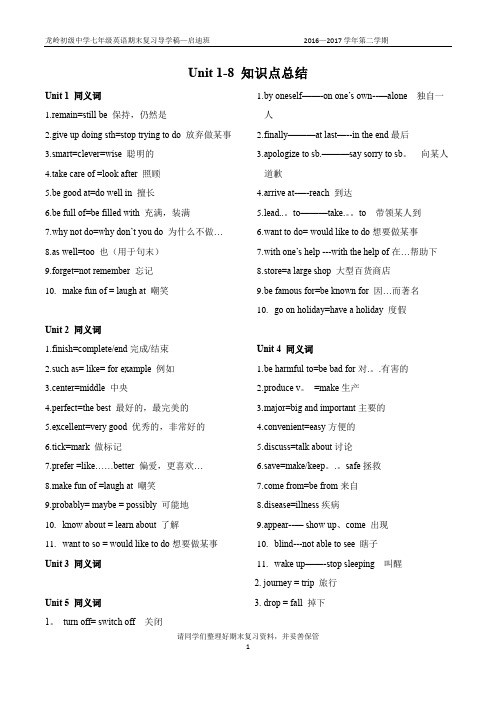
Unit 1-8 知识点总结Unit 1 同义词1.r emain=still be 保持,仍然是2.g ive up doing sth=stop trying to do 放弃做某事3.s mart=clever=wise 聪明的4.t ake care of =look after 照顾5.b e good at=do well in 擅长6.b e full of=be filled with 充满,装满7.w hy not do=why don’t you do 为什么不做…8.a s well=too 也(用于句末)9.f orget=not remember 忘记10.make fun of = laugh at 嘲笑Unit 2 同义词1.f inish=complete/end完成/结束2.s uch as= like= for example 例如3.c enter=middle 中央4.p erfect=the best 最好的,最完美的5.e xcellent=very good 优秀的,非常好的6.t ick=mark 做标记7.p refer =like……better 偏爱,更喜欢…8.m ake fun of =laugh at 嘲笑9.p robably= maybe = possibly 可能地10.know about = learn about 了解11.want to so = would like to do想要做某事Unit 3 同义词1.b y oneself——-on one’s own--—alone 独自一人2.f inally———at last—--in the end最后3.a pologize to sb.———say sorry to sb。
向某人道歉4.a rrive at-—-reach 到达5.l ead..。
to———take.。
- 1、下载文档前请自行甄别文档内容的完整性,平台不提供额外的编辑、内容补充、找答案等附加服务。
- 2、"仅部分预览"的文档,不可在线预览部分如存在完整性等问题,可反馈申请退款(可完整预览的文档不适用该条件!)。
- 3、如文档侵犯您的权益,请联系客服反馈,我们会尽快为您处理(人工客服工作时间:9:00-18:30)。
七年级英语下册复习
一.同义词替换
1. join =be a member of,意思是“参加、加入”某一组织或团体。
2. am good at + 动词-ing = do well in + 动词–ing;
is good at + 动词-ing = does well in + 动词–ing;
are good at + 动词-ing = do well in + 动词–ing;
3. after school = after class:放学后;
4. free = have time = not busy:空闲的、有空的;
free = needn’t pay for it = do not need money 免费的;
5. busy = don’t have time = not free:繁忙的;
6. interesting = fun = not boring:有趣的;
7. on the weekend = on weekends = on Saturdays and Sundays:在周末;
8. easy = not difficult = not hard:容易的;
9. difficult = hard = not easy:困难的;
10. eat breakfast = have breakfast 吃早餐
eat lunch = have lunch 吃午餐
eat dinner = have dinner 吃晚餐
11. have cake = eat cake 吃蛋糕;
12. excellent = nice = great 好极了
13. interesting = fun = not boring有趣的;
boring = not interesting = not fun无聊的;
14. expensive = dear = not cheap 昂贵的;
cheap = not expensive = not dear便宜的;
15. 当a lot of = lots of = many时,它们之后接的是可数名词的复数形式;
当a lot of = lots of = much时,它们之后接的是不可数名词;
16. about = around 大约
17. last weekend = last Saturday and Sunday 上个周末;
18. on weekdays = from Monday to Friday 在工作日;
19. over = more than 多于、超过;
20. kind of = a little 有点儿;
21. shout at = shout to 对…大声叫喊;
22. scary = scared可怕的、吓人的;
23. useful = helpful有用的、有帮助的;
24. tell a story = tell stories 讲故事
25. take a photo = take photos拍照;
26.around = all over遍及; around the world=all over the world 世界各地;
27. at night = in the evening :在晚上
28. What time = When :几点
29. 在8:30表达为at eight thirty = at half past eight
30. 6:15表达为a quarter past six.或six fifteen .
31. 6:45表达为a quarter to seven.或six forty-five.
32. 7:30表达为half past seven.或seven thirty .
33. 8:20表达为twenty past eight.或eight twenty.
34. 9:50表达为ten to ten.或nine fifty.
35. 6:30表达为half past six = six thirty
36. 3:15表达为a quarter past three = three fifteen
37. 6:45表达为a quarter to seven = six forty-five
38. 9:45表达为a quarter to ten = nine forty-five
39. 在5:30表达为at half past five = at five thirty
40. 在10:30表达为at ten thirty = at half past ten
41. half an hour = thirty minutes:半个小时
an hour = sixty minutes:一小时
42. sometimes = at times 有时、偶尔
43. before 10:00 = by 10:00:在十点之前
44. take the train = go … by train:乘火车
45. take the bus = go … by bus:乘公交车
46. take the subway = go … by subway:乘地铁
47. ride a bike = go … by bike:骑自行车
48. walk = go … on foot:走路、步行
49. What about you ? = How about you ?你呢?
50. must = have to必须
51. keep quiet = be quiet 保持安静
52. am from = come from 来自; is from = come s from 来自
are from = come from 来自
53. have = keep 饲养
54. a lot = very much 非常
like…a lot = like …very much 非常喜欢
55. get lost = be lost 迷失、迷路
56. wash the dishes = do the dishes 洗餐具
57. be at home = be in 在家
be not at home = be not in 不在家
58. See you = Goodbye 再见
59. want = would like 想要
60. How’s the weather ? = What’s the weather like?今天的天气怎么样?
61. have a good time = have fun = have a good day = enjoy oneself 玩得开心(可用
来表示祝福)
62. great = fine = sunny 晴朗的
63. have a good time + 动词-ing = have fun + 动词-ing .
64. have to +动词原形= must + 动词原形;
65. around here = near here 在这附近
66. Thanks so much. = Thank you very much. 非常感谢
67. No pro blem. = You’re welcome. 不用谢、不客气;
68. tall = not short 高的;
69. short = not tall 矮的;
70. long = not short 长的;
71. short = not long 短的;
72. curly = not straight 卷的;
73. straight = not curly 直的;
74. thin = not heavy = not fat 瘦的;
75. heavy = fat = not thin 胖的、重的;
76. young = not old 年轻的;
77. medium height = not tall or short 中等身高;
78. medium build = not heavy or thin 中等身材;
79. be different from = not the same as 与……不同;
80. the same age as = as old as 和……岁数一样大;
81. cross = go across 从…的表面穿过;
82. talk to = talk with与某人交谈
83. be good with = get on well with与某人相处得好,与某人合得来;。
